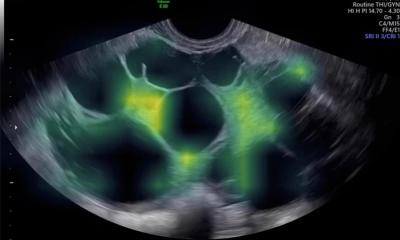Video • Digital patient support tool
Ovarian cancer: "Olivia" to provide information and support
The Ovarian Cancer Commitment (OCC) announced the launch of a digital, dedicated resource for all people affected by ovarian cancer. This dynamic and interactive resource, named Olivia, provides a pathway to support people navigating an ovarian cancer diagnosis and aims to prepare and guide them through every stage of their ovarian cancer experience.
Olivia is a comprehensive tool that provides a single source of information for those diagnosed, being treated for and living with ovarian cancer, as well as their families, support networks and healthcare teams.
The quality of life for a person living with ovarian cancer is often severely compromised by psychosocial issues, including personal and family distress at the initial diagnosis, along with fears about the future.1 "Olivia contains comprehensive information on everything an ovarian cancer patient may need or want to know at every stage of their experience, from symptoms, diagnosis and initial treatment to ongoing care and recurrence," the OCC states. "Patients can come to Olivia to search for information at any time, meaning they always have support and a wide-ranging guide on which they can rely upon."
Resources provided by Olivia include:
- an interactive ovarian cancer pathway;
- guidance on diagnosis and living with ovarian cancer;
- stories from women diagnosed with ovarian cancer;
- a directory of patient organisations; and
- a glossary of medical terms translated to layman’s language,
to provide support to everyone, including caregivers.
A resource like Olivia simply didn’t exist previously, and patients and their loved ones were often lost trying to find the information that would support them on the internet
Nicole Concin
All the information on Olivia has been developed by the OCC founding partners, the European Society of Gynaecological Oncology (ESGO), the European Network of Gynaecological Cancer Advocacy Groups (ENGAGe) and AstraZeneca and has been reviewed and validated by medical experts and ovarian cancer patients.
Nicole Concin, ESGO President, said: “When patients first receive the diagnosis of ovarian cancer, they often feel scared, confused and uninformed. There is a high need for information, which is primarily provided by the treating specialised physician and the healthcare team in individual consultations with the patient. However, very often more questions arise once at home. Olivia is an all-in-one resource that patients can access to educate themselves and where they can find reliable information on both the medical aspects of ovarian cancer, such as treatment options, as well as the emotional aspects, including how ovarian cancer may impact their relationships, work and more. A resource like Olivia simply didn’t exist previously, and patients and their loved ones were often lost trying to find the information that would support them on the internet. I am convinced that Olivia will be most valuable in transforming the experience of ovarian cancer patients and their families and friends.”
Petra Adamkova, Co-Chair, ENGAGe, said: “Following diagnosis, patients can find it challenging to find a balance between focusing on their cancer treatment and trying to live as normal a life as possible. Olivia offers suggestions on how to take care of physical and emotional needs whilst living with ongoing cancer treatment, so patients can aim to achieve a better quality of life. In addition, it includes a directory of patient advocacy group across Europe to help patients find further support closer to home if needed.”
Andrea Mugan, Global Franchise Head, Gynaecological/Genitourinary Cancers, AstraZeneca, said: “Olivia is the first initiative launched by the OCC as part of our mission to address gaps in ovarian cancer care. We are committed to improving the quality of life for those living with ovarian cancer, and following the launch of Olivia, we will continue to implement tangible actions to drive this change.”
For more information on Olivia, visit: https://ovarian.gynecancer.org/
Reference:
Source: European Society of Gynaecological Oncology
31.10.2022











